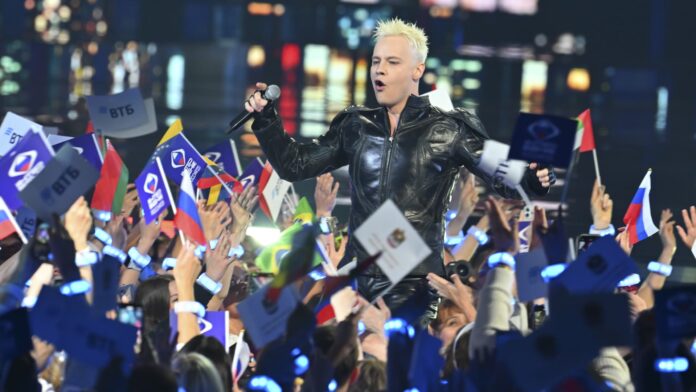MOSCOW, RUSSIA – SEPTEMBER 21: Shaman of Russia performs during the new global song competition called Intervision, initially positioned as a response to the long-running European Eurovision music contest, in Moscow, Russia on September 21, 2025. (Photo by Sefa Karacan/Anadolu via Getty Images)
Anadolu | Anadolu | Getty Images
Since Russia found itself cast out of the Western cultural and sporting sphere following its full-scale invasion of Ukraine, it has tried in earnest to create something of a “parallel world” of events and institutions that could act as substitutes.
After launching the war against its neighbor in 2022, Russia was banned from participating in the Olympic Games, a competition in which it had traditionally fared well, although its success was often accompanied by various doping scandals. It was also barred from more light-hearted cultural events, such as the Eurovision Song Contest.
Russia has sought to turn its banishment to its advantage, however, looking to replace such events with home-grown versions.
While Russians understand that such substitutes are not the genuine articles, many have seen efforts to recreate sporting and cultural events as a patriotic effort to rekindle Russia’s Soviet-era, which Russian President Vladimir Putin frequently references with nostalgia.
“The majority of Russians believe that Russia was unfairly excluded from most of the international events, so these substitutes make sense in terms of providing some alternative,” according to Anton Barbashin, a Russian political analyst and editorial director of the journal Riddle, told CNBC Thursday.
“[They have a kind of attitude that they’re] ‘better than nothing’ but of course only a minority of people would treat them as a real deal. For the older generation, it is a reminder of Soviet-organized events. Often Putin is framing them in this way as well — as a revival of old traditions,” Barbashin said by email.
Barbashin characterized Russia’s strategy of “import-substitution” as one that was done out of “pure necessity.”
Soviet revival?
The Kremlin has frequently described its isolation from the West as “Russophobic” and sought to position itself as the victim of Western hegemony, while calling for a new “global order.”
The war in Ukraine has certainly led to Russia to look beyond the West to foster economic and cultural ties, with varying degrees of success.
Russia said in May 2023 that it was going to create an alternative to the Olympic Games known as the “World Friendship Games” but it announced in late 2024 that it was postponing the event indefinitely, without providing a reason.
The postponement came after heavy criticism from the International Olympic Committee, which said the games were a “cynical attempt” to politicize sport and urged athletes to boycott the event.
An event that ostensibly had more success was Russia’s relaunch, this September, of the Soviet-era Intervision Song Contest. An alternative to the popular European event Eurovision, Russia said its version of the contest would foster cultural ties between countries that were outside the West.
There was some bemusement over the contest among commentators, and critics said it was a propaganda tool, but the competition attracted singers from 23 countries (notably, the U.S.’ original entrant pulled out of the contest at the last minute) and the competition was won by Vietnam’s Duc Phuc.
Russia’s President Vladimir Putin’s image is displayed on a screen of the main stage of the Intervision Song Contest at the Live Arena in Moscow on September 20, 2025.
Olesya Kurpyayeva | Afp | Getty Images
Such events were not intended to try to replace international ones that Russia can no longer participate in, one Russian analyst said, but were meant to be alternatives.
“It is true that [Russian substitute events] cannot replace genuine international events, nor is that its purpose, but it is supposed to create alternative platforms — a space where Russia can operate and develop something that is ‘friendly’ yet still international,” Tatiana Stanovaya, a Russian political analyst and founder of the political analysis firm R. Politik, told CNBC Thursday.
“It is based on the idea of Western decline and the enforcement of multipolarity. Domestically, it carries significant meaning in terms of managing resources, political dividends, and visibility,” Stanovaya said.
Does Russia want back in?
The war in Ukraine is ongoing, with little sign that Russia wants to re-engage with the West, particularly when it comes to Kyiv, despite U.S. President Donald Trump’s calls for a ceasefire and for Moscow to come to the negotiating table.
The Kremlin has said it wants peace but has demanded that Ukraine cede partially Russian-occupied territory in eastern Ukraine to Russia, which Kyiv refuses to do.
Despite the ongoing war, and anti-Western rhetoric that has become embedded in Kremlin and state media commentary, Russia is likely to be ready and willing to participate in future global cultural and sporting events should circumstances change.
Russian President Vladimir Putin passes symbolic FIFA World Cup Baton to Qatari Emir Tamim bin Hamad al-Thani (not pictured) during the ceremony at the Kremlin, in Moscow, Russia, July,15,2018. Qatar is hosting FIFA World Cup in 2022.
Mikhail Svetlov | Getty Images
“We’ve seen many times before that it was highly important for Russia to be part of international, global events. The FIFA World Cup 2018 [hosted by Russia] was the highest moment in Russian history for that,” Barbashin said, adding that “it matters greatly for the people.”
Asked if Russia would, once the war in Ukraine ends, like to participate once again in global events, Barbashin was emphatic:
“Absolutely, [at the] first chance Russia has. Russia’s entire conversation has always been, and is with, the West. The swing back to it is inevitable,” he said.
Eurovision Song Contest,Olympic games,Donald Trump,Vietnam,Vladimir Putin,Ukraine,Russia,business news
#Russia #created #parallel #world #Olympics #Eurovision

